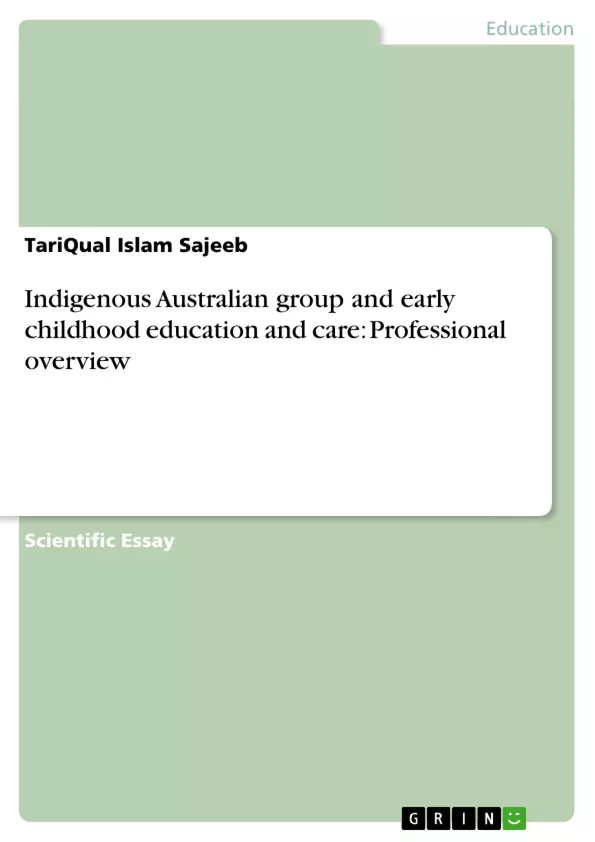Childcare is one of the priority areas for the National Development Plan and the Equal Opportunities.Concern that too several Australian youngsters, notably native youngsters, don't seem to be able to begin school has spurred a series of changes to the pre-school sector. Enclosed among these changes square measure nationwide mass mensuration and also the introduction of a unified syllabus framework along with moves towards standardized entry assessment. The pre-primary age is a particularly sensitive period in children’s development. A variety of socioeconomic factors will have a major negative impact on children’s psychological development and chances of success at school. These include: poverty; happiness to deprived social classes; functional illiteracy and low levels of academic attainment of parents; and spiritual traditions associated with a cultural life wherever literacy isn't highly regarded.
Inhaltsverzeichnis (Table of Contents)
- Introduction
- Native youngsters of Australia and their pre-schooling
- Socio-economic factors and impacts on schooling
- Cultural beliefs and values towards schooling opportunity
- Importance of childhood education among indigenous group
- Cause of staying behind and suggestion
Zielsetzung und Themenschwerpunkte (Objectives and Key Themes)
This text examines the challenges faced by Indigenous children in Australia's early childhood education and care system. It explores the complex factors contributing to their educational disadvantage, including socioeconomic disparities, cultural beliefs, and the impact of government policies.- The importance of early childhood education for Indigenous children in Australia.
- The impact of socio-economic factors on Indigenous children's educational development.
- The role of cultural beliefs and values in shaping attitudes towards schooling among Indigenous families.
- The challenges of poor school attendance and participation among Indigenous children.
- The need for increased Indigenous representation in early childhood education and care programs.
Zusammenfassung der Kapitel (Chapter Summaries)
- Introduction: Introduces the topic of early childhood education and care in Australia, highlighting its importance for children's development and the wider community. It also defines the scope of the text, focusing on the experiences of Indigenous children.
- Native youngsters of Australia and their pre-schooling: Discusses the concerns surrounding Indigenous children's readiness for school and the impact of policy changes on their transition to formal education. It highlights the need for a deeper understanding of Indigenous culture and language in early childhood education.
- Socio-economic factors and impacts on schooling: Explores the negative effects of poverty, social deprivation, and low levels of parental education on Indigenous children's development and school success. It emphasizes the role of early childhood education in mitigating these disadvantages.
- Cultural beliefs and values towards schooling opportunity: Analyzes the influence of cultural beliefs and values on Indigenous families' attitudes towards early childhood education. It explores the potential conflict between Indigenous and Western approaches to child-rearing and learning.
- Importance of childhood education among indigenous group: Underscores the importance of early childhood education for Indigenous children, highlighting the need for culturally appropriate and sensitive practices. It discusses various factors that contribute to mistrust and low participation among Indigenous families.
- Cause of staying behind and suggestion: Examines the reasons behind Indigenous children's lagging academic progress, including poor school attendance. It presents data on absenteeism rates and analyzes the societal consequences of educational disadvantage. The chapter also suggests solutions, emphasizing the need for increased Indigenous representation in the workforce.
Schlüsselwörter (Keywords)
This text focuses on the intersection of Indigenous culture, early childhood education, and social policy in Australia. Key terms include Indigenous children, early childhood education and care, socio-economic factors, cultural beliefs, school attendance, Indigenous representation, and policy reform. The text examines the challenges faced by Indigenous children in accessing quality education and the need for culturally responsive approaches to improve their educational outcomes.Frequently Asked Questions
Why is early childhood education critical for Indigenous children?
The pre-primary age is a sensitive period where socioeconomic disadvantages like poverty and low parental literacy can be mitigated to ensure school success.
What socio-economic factors impact Indigenous schooling?
Key factors include poverty, social deprivation, functional illiteracy, and cultural traditions where Western-style literacy may not be highly regarded.
How do cultural beliefs influence attitudes toward Western schooling?
There can be a conflict between Indigenous child-rearing practices and Western educational frameworks, leading to mistrust or low participation.
What are the main causes of Indigenous children staying behind in school?
High rates of absenteeism and a lack of culturally sensitive curriculum are major contributors to the educational disadvantage.
How can the Australian pre-school sector be improved for native youngsters?
Suggestions include increasing Indigenous representation in the workforce and implementing unified, culturally responsive syllabus frameworks.
- Citation du texte
- TariQual Islam Sajeeb (Auteur), 2013, Indigenous Australian group and early childhood education and care: Professional overview, Munich, GRIN Verlag, https://www.grin.com/document/272334



